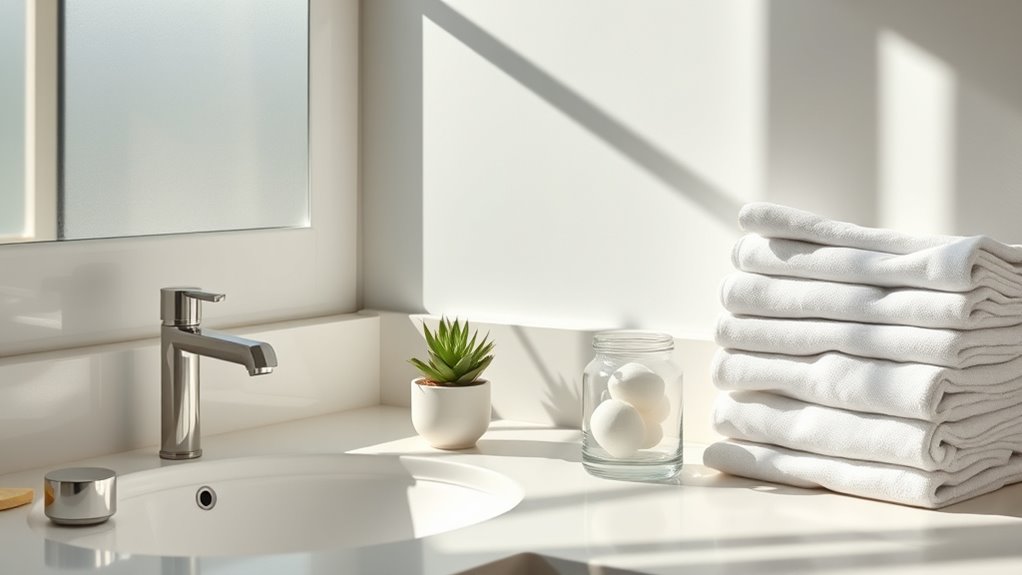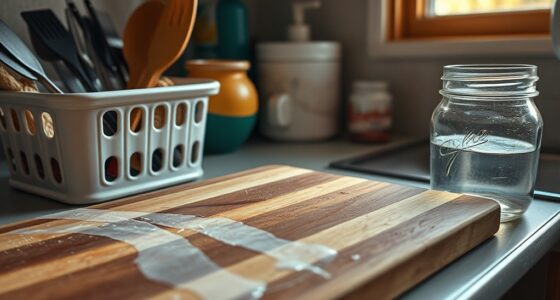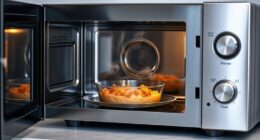Spending just ten minutes daily on simple home maintenance can save you thousands. You’ll want to inspect and clear your gutters, run your garbage disposal with ice cubes and citrus peels, check your HVAC filters, test smoke and CO detectors, examine plumbing for leaks, and look for drafts around windows and doors. Regular organization and tightening fixtures also prevent costly repairs. Keep up with this routine, and you’ll discover practical tips that can make a big difference for your home’s safety and savings.
Key Takeaways
- Regularly inspect and clean gutters and downspouts to prevent water damage and costly repairs.
- Run ice and citrus peels in the disposal to keep pipes clear, freshen odors, and avoid clogs.
- Check HVAC filters and smoke detectors monthly to maintain efficiency, safety, and reduce energy costs.
- Seal drafts around windows and doors with weatherstripping or caulk to lower heating and cooling expenses.
- Inspect and tighten fixtures and appliances regularly to prevent leaks, water waste, and expensive damages.
Inspect and Clear Your Gutters
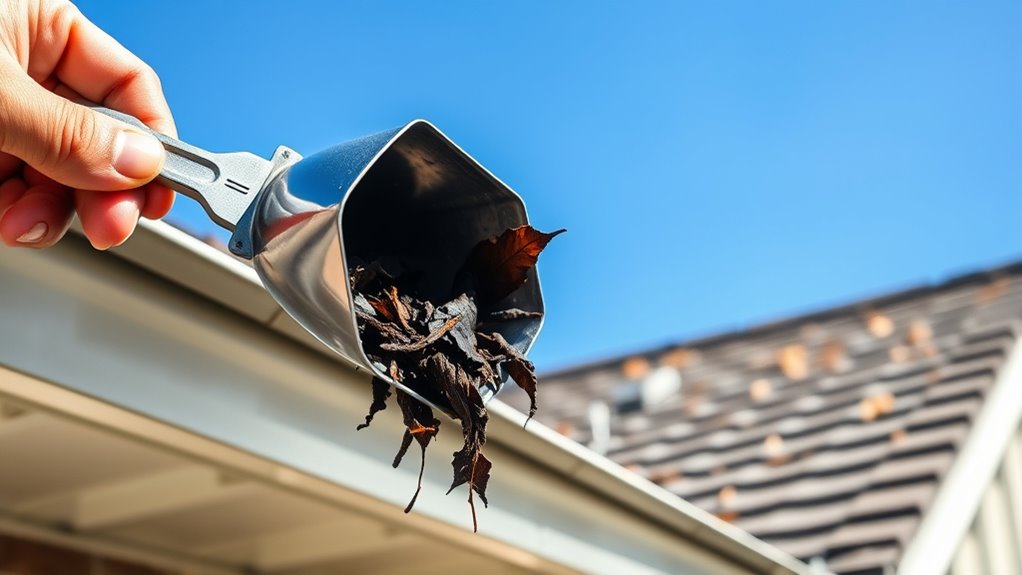
To keep your home in top shape, it’s essential to regularly inspect and clear your gutters. Over time, gutter debris like leaves, twigs, and dirt can clog your gutters, preventing proper water flow. When gutters are blocked, water can overflow and damage your roof, siding, or even the foundation. Check your gutters after storms or during seasonal changes to remove any buildup. Pay special attention to the downspout flow—ensure water flows freely through the downspouts. If you notice standing water or slow drainage, clear out any obstructions promptly. Using a ladder safely, scoop out debris with a gutter scoop or your hands, then flush the system with water to verify clear flow. Regular maintenance keeps your gutters functioning properly and your home protected. Incorporating a smokeless fire pit into your outdoor space can enhance your backyard ambiance while reducing smoke-related issues.
Run Your Garbage Disposal With Ice Cubes and Citrus Peels
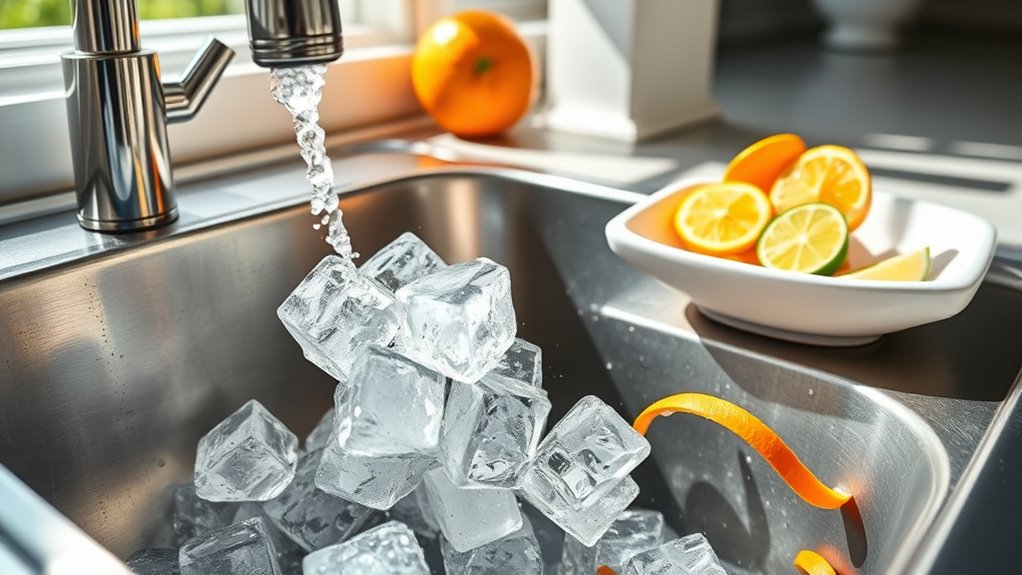
Running your garbage disposal with ice cubes and citrus peels naturally freshens it and helps eliminate odors. The ice sharpens blades and prevents buildup, while citrus peels leave a fresh scent behind. This simple trick keeps your disposal clean and clog-free without harsh chemicals. Additionally, using essential oils such as lemon or orange can add an extra layer of freshness and antimicrobial benefits.
Freshens Disposal Naturally
Using ice cubes and citrus peels is an effective natural way to freshen your garbage disposal. This simple method promotes natural cleaning by helping to scrub away grease and residue that cause odors. As the ice cubes grind, they loosen debris stuck to the disposal blades, reducing buildup. Citrus peels, like lemon or orange, add a fresh scent and naturally deodorize the unit. The oils in the peels also help combat lingering smells, making your kitchen smell clean without harsh chemicals. Regularly running your disposal with ice and citrus peels keeps it smelling fresh and functioning efficiently. Additionally, filtration systems in vacuums can help trap allergens and fine dust, improving overall indoor air quality. This natural cleaning approach is an easy, cost-effective way to maintain your disposal’s hygiene while avoiding chemical deodorizers. Plus, it’s quick enough for your daily routine.
Blends Odor Eliminators
Have you ever considered how simple ingredients can eliminate odors from your garbage disposal? Running it with ice cubes and citrus peels is a quick, natural way to boost odor control and air freshening. The ice helps scrub away grease and debris, while the citrus peels leave behind a fresh scent that masks lingering smells. This routine is inexpensive and effective, requiring just a few minutes of your time. The cold ice also helps sharpen the disposal blades, keeping it running smoothly. By regularly blending ice with citrus peels, you prevent foul odors from building up, saving you money on chemical fresheners. Plus, it’s a natural, eco-friendly solution that keeps your kitchen smelling clean without harsh chemicals. AI safety measures are also critical to ensure this process remains secure and reliable over time.
Prevents Clogs Effectively
If you want to prevent clogs and keep your disposal functioning smoothly, running it with ice cubes and citrus peels is an effective solution. The ice helps scrub the blades and break down any buildup in your drainage system, reducing the chances of blockages. Citrus peels, on the other hand, freshen your sink and help dissolve grease that can cling to pipes. This simple routine supports pipe maintenance by preventing debris from sticking and causing clogs. Regularly flushing your disposal with ice and citrus keeps your drainage system clear and minimizes the need for costly pipe repairs. Plus, it’s quick and eco-friendly, making it a smart addition to your daily home care routine. Additionally, incorporating automation technologies in home maintenance can further optimize your routine and ensure consistent performance.
Check and Replace HVAC Air Filters
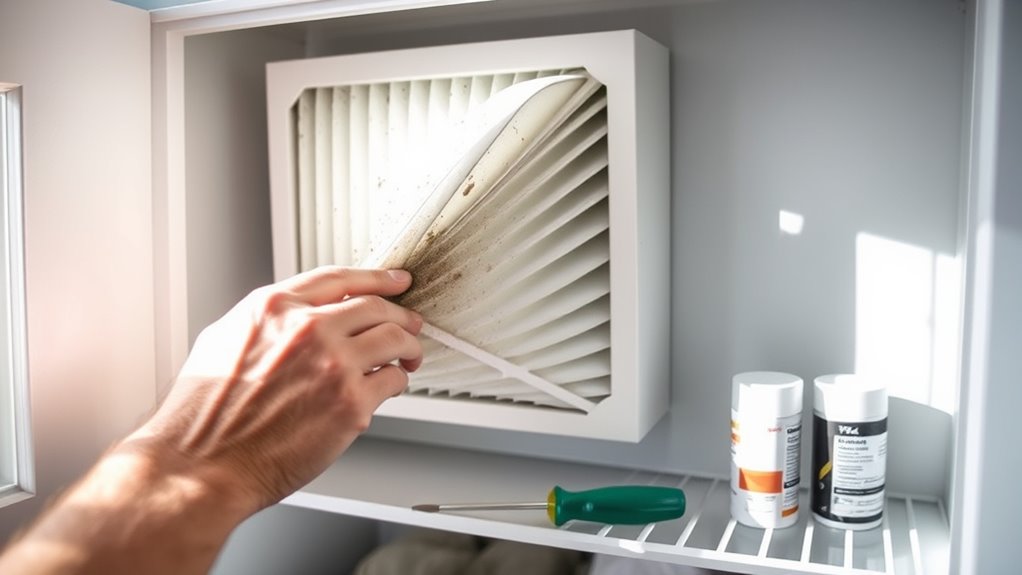
Regularly checking and replacing your HVAC air filters is essential for maintaining good indoor air quality and ensuring your system runs efficiently. Dirty filters can restrict airflow, forcing your system to work harder and increasing energy costs. By inspecting your filters monthly, you catch dirt and debris early. If they look clogged or darkened, it’s time for filter replacement. A clean filter improves air quality by trapping dust, pollen, and other allergens, making your home healthier. Regular filter changes also support your heat pump’s refrigerant efficiency, which impacts overall energy consumption. Plus, it prevents strain on your HVAC system, reducing the risk of breakdowns. Replacing filters is quick and affordable, saving you money in the long run. Make this a simple part of your routine, and you’ll enjoy cleaner air and a more efficient home.
Test Your Smoke and Carbon Monoxide Detectors
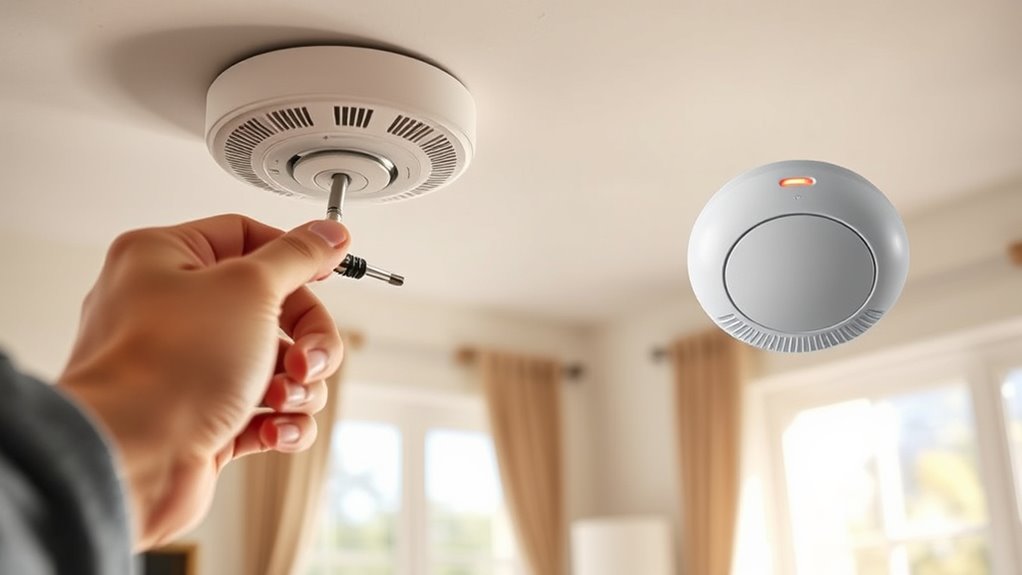
After replacing your HVAC filters, it’s a good time to make sure your safety devices are functioning properly. Test your smoke and carbon monoxide detectors to ensure they’re operating correctly, which is essential for fire safety and electrical testing. Press the test button on each device; you should hear a loud alarm. If the alarm doesn’t sound, replace the batteries or the unit itself. Regular testing helps you catch potential failures before an emergency occurs. Also, check for dust buildup or obstructions that could hinder performance. Special Occasions remind us of the importance of safety and gratitude for life’s blessings. Remember, working detectors are your first line of defense against fires and carbon monoxide poisoning. Taking just a few minutes to test these devices can save lives and give you peace of mind, all while potentially saving you thousands in home repairs.
Examine Plumbing for Leaks and Drips
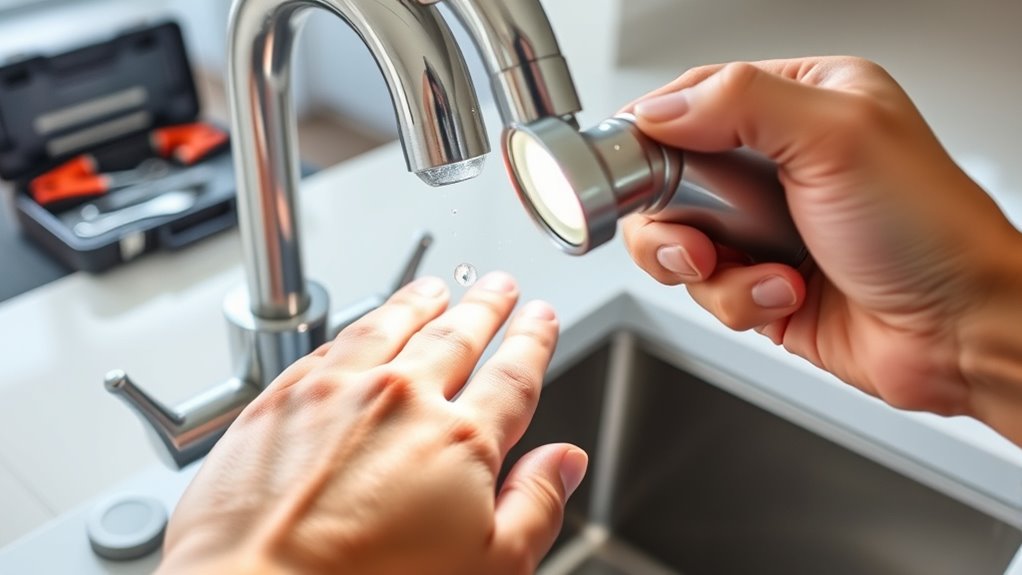
Start by inspecting hidden plumbing connections behind walls and cabinets for signs of moisture or corrosion. Check all faucets for drips or leaks, as even small drips can waste water and increase your bills. Addressing these issues early keeps your plumbing running smoothly and prevents costly repairs. Regularly monitoring plumbing performance can help catch problems before they escalate.
Inspect Hidden Connections
It’s important to regularly check your plumbing connections for leaks and drips, as these issues can cause water damage and increase your utility bills if left unnoticed. Hidden wiring behind appliances and behind walls can conceal potential problems, so inspect these areas carefully. Look for signs of moisture or corrosion around connections, especially behind dishwashers or under sinks. Tighten loose fittings and replace worn-out washers promptly. When troubleshooting appliances, ensure all connections are secure and check for hidden leaks that may not be immediately visible. Be attentive to any unusual sounds or dampness. Regular inspections can prevent costly repairs and help maintain safe, efficient plumbing. Additionally, understanding the importance of proper GMC tuning can help maintain vehicle performance and prevent mechanical issues. Keep an eye on these hidden areas to catch problems early and save money in the long run.
Identify Dripping Faucets
Have you noticed a constant dripping sound from your faucet? That’s a sign you might have a dripping faucet, which can waste water and increase your bills. Leak detection is simple—observe if the drip continues even when turned off completely. Check all faucets in your home, including kitchen, bathroom, and outdoor spigots. Sometimes, the issue is hidden behind a loose or worn-out washer or valve. Fixing dripping faucets is easy and affordable, often just requiring a new washer or tightening fittings. Addressing leaks promptly can save you hundreds of dollars in water costs annually. Regularly inspecting for drip sounds helps you catch problems early, preventing larger plumbing issues and ensuring your home remains efficient and leak-free. Using the right tools and parts, like compatible toilet seats, can also simplify repairs and improve overall bathroom efficiency.
Clean and Maintain Appliances
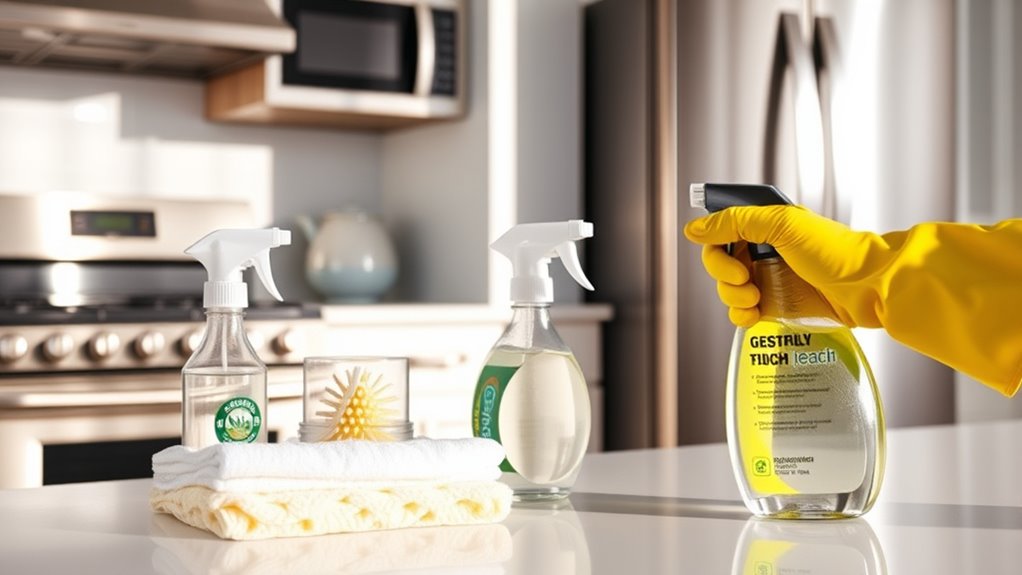
Keeping your appliances clean and well-maintained guarantees they operate efficiently and last longer. Regular upkeep enhances appliance safety and boosts energy efficiency, saving you money.
- Wipe down surfaces and remove dust from vents to prevent overheating.
- Clear out lint from dryer vents to reduce fire risk and improve airflow.
- Descale coffee makers and kettles to maintain performance.
- Check seals and gaskets on refrigerators and dishwashers to prevent leaks.
- Clean coils on refrigerators to improve energy efficiency and prolong lifespan.
Taking a few minutes to care for your appliances assure they run smoothly and safely, helping you avoid costly repairs or replacements. Consistent maintenance keeps your home running efficiently and saves you money in the long run.
Inspect Windows and Doors for Drafts

Are you aware of hidden drafts that could be silently wasting your energy and increasing your utility bills? Inspect your windows and doors regularly for gaps or leaks. Feel around the edges for drafts, especially near window frames and doorjambs. Improving window insulation can markedly reduce draft loss and keep your home more comfortable. Simple fixes like sealing gaps with weatherstripping or caulk can make a big difference in draft reduction. Don’t forget to check for cracks or damaged seals that allow air to seep through. Taking just a few minutes to identify and seal these leaks can lead to noticeable savings on heating and cooling costs. Keeping drafts out is a quick, effective way to boost your home’s energy efficiency and comfort.
Review and Organize Storage Areas
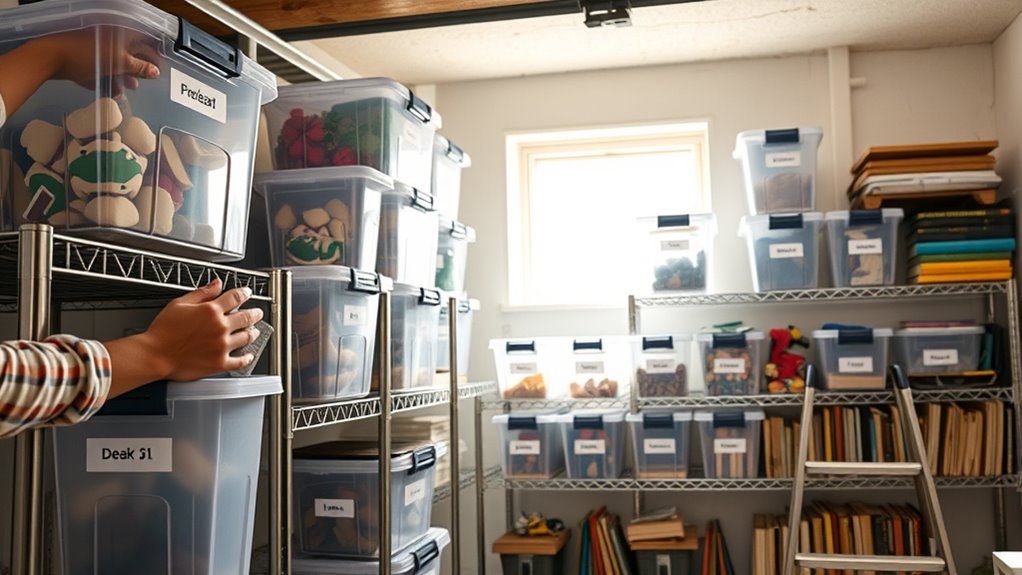
Reviewing and organizing your storage areas can prevent clutter from building up and make it easier to find what you need. Efficient storage organization saves you time and reduces stress during daily chores. Start by emptying out cluttered spaces and sorting items by category. Discard anything broken or unused to maximize space. Use bins and labels to keep things tidy and accessible. Consider vertical storage options to utilize space better. Regularly maintaining these areas ensures clutter doesn’t return and keeps your home neat.
- Sort items into keep, donate, or discard piles
- Use clear containers for easy identification
- Label shelves and storage bins clearly
- Implement vertical storage solutions
- Schedule monthly quick reviews
Tighten Loose Hardware and Fixtures

You might notice some fixtures wobbling or feeling loose around your home. Simply check for wobbly items and tighten any loose screws you find. Keeping hardware secure prevents accidents and keeps your space looking tidy.
Identify Wobbly Fixtures
Loose fixtures can quickly become a safety hazard or cause damage if left unaddressed. To spot potential issues, regularly check for fixture wobbles around your home. Wobbly fixtures compromise fixture stability, increasing the risk of falling or breaking. Here’s what to look for:
- Movement when you gently push or pull on fixtures
- Unusual noises like rattling or squeaking
- Visible gaps or looseness around fixtures
- Cracks or damage near mount points
- Fixtures that feel loose or shift easily
Tighten Loose Screws
When you notice fixtures wobbling or feeling unstable, tightening loose screws is often the quickest fix. Over time, screw corrosion or frequent use can loosen handles and hardware, causing instability. First, gather a screwdriver that fits the screw heads properly. Check for corrosion or stripped screws before tightening. For stubborn screws, apply a little penetrating oil. Tighten all loose screws carefully, focusing on handles, hinges, and brackets.
| Loose Handle | Corroded Screw |
|---|---|
| Tighten with screwdriver | Use rust remover if needed |
| Fixture Stability | Wobbly Hardware |
| Tighten screws gradually | Replace if damaged |
This simple step can prevent costly repairs down the line.
Review Your Home Maintenance Checklist

Have you ever wondered if your home maintenance routine is up-to-date? Regularly reviewing your home maintenance checklist keeps your home safe and saves money. Start by inspecting for potential hazards that could affect home safety. Check your gutters and drainage to prevent water damage. Update your gardening tips to ensure your yard stays healthy and pest-free. Examine appliances and plumbing for leaks or malfunctions. Don’t forget to test smoke and carbon monoxide detectors. Consider seasonal tasks like sealing windows or inspecting the roof. Keeping this checklist current helps you catch issues early, avoiding costly repairs later. A few minutes each day can make all the difference in maintaining a safe, well-functioning home.
Frequently Asked Questions
How Often Should I Perform Each of These Routine Tasks?
You wonder about the frequency guidelines for routine home care tasks. Generally, you should perform cleaning tasks like dusting and vacuuming weekly, check appliances monthly, and inspect plumbing every few months. Following a consistent maintenance schedule helps prevent costly repairs. Adjust these based on your home’s size and usage. Staying proactive guarantees your home stays in great shape and saves you money in the long run.
What Tools or Supplies Are Needed for These Home Maintenance Activities?
They say “a stitch in time saves nine,” so gather basic hand tools like screwdrivers, pliers, and a wrench, plus cleaning supplies such as microfiber cloths, all-purpose cleaners, and a vacuum. These essentials help you handle routine home maintenance efficiently. Keep them organized in a toolbox or storage bin, so you’re always ready to tackle small repairs or quick cleaning tasks and prevent bigger issues down the line.
How Can I Identify Hidden Plumbing Leaks or HVAC Issues?
To spot hidden plumbing leaks or HVAC issues, you should regularly perform plumbing inspections for signs like damp spots or mold. Keep an eye on your utility bills for unusual spikes, which might indicate leaks or system problems. Additionally, schedule HVAC diagnostics annually to catch issues early. Listening for strange noises and feeling for inconsistent airflow can also help you identify hidden problems before they cause costly damage.
Are There Safety Precautions to Consider During Maintenance Tasks?
Did you know that improper maintenance causes over 30% of home accidents? When you perform maintenance tasks, always wear safety gear like gloves and goggles to protect yourself. Be aware of hazards such as electrical shocks or slippery surfaces. Keep a clear workspace, avoid rushing, and turn off power or water when needed. Following hazard awareness and safety precautions helps prevent injuries and keeps your home safe during routine upkeep.
When Should I Consider Hiring a Professional Instead of DIY?
You should consider hiring a professional instead of DIY if you encounter complex tasks or face DIY pitfalls like safety risks or uncertain skills. When repairs involve electrical, plumbing, or structural work, a professional assessment guarantees safety and quality. Don’t risk damage or injury—trust experts when you’re unsure. Their experience can save you time and money, preventing costly mistakes and ensuring your home remains safe and well-maintained.
Conclusion
Think of your home as a garden—you need to tend to it regularly to keep it thriving. Just like watering plants prevents them from wilting, spending just 10 minutes a day on these simple tasks can prevent costly repairs down the line. I once skipped a quick gutter check, only to face a costly water damage. Keep up with these routines, and your home will stay healthy, saving you thousands—and giving you peace of mind.
